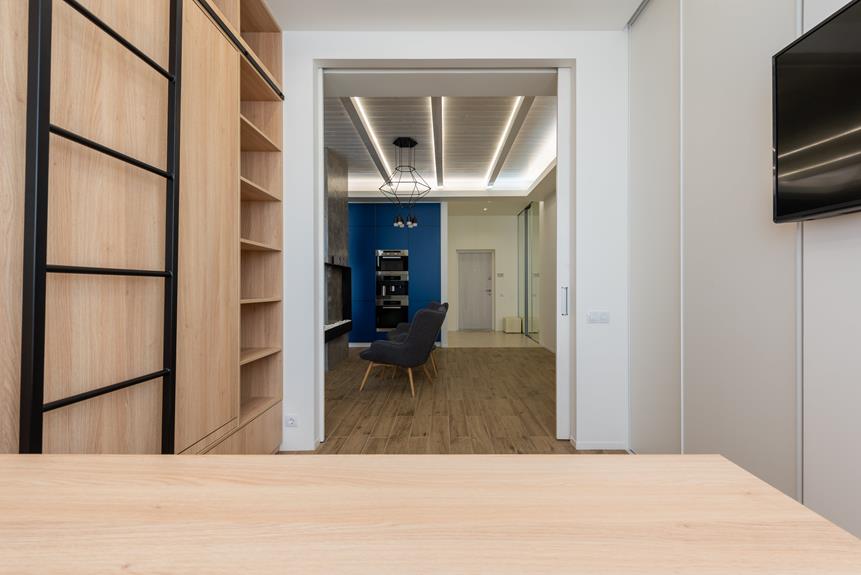When you picture your ideal home office, do you see a serene, focused space or a hub of distractions?
Having your desk next to the TV may seem convenient, but is it truly conducive to productivity?
Let's delve into the pros and cons of this setup to help you master your home office environment.
Key Takeaways
- Having your desk next to the TV can lead to distractions, reducing productivity.
- Positioning your desk away from the TV is crucial for maintaining optimal focus and concentration.
- Positioning your desk next to the TV can lead to ergonomic issues and eye strain.
- Multitasking by working while watching TV can hinder mental clarity and productivity.
Distractions and Productivity
When working from home, having your desk next to the TV can lead to distractions, reducing your productivity. The impact on efficiency within your home environment is significant when your focus is constantly drawn away from your tasks. The temptation to switch on the TV for background noise or catch up on your favorite show can be alluring, but it can disrupt your workflow and hinder your ability to concentrate.
Creating a designated workspace away from the TV can help you maintain your focus and increase your productivity. By eliminating the potential for distractions, you can optimize your home environment for peak performance. This simple adjustment can make a substantial difference in your ability to complete tasks efficiently and effectively.
Furthermore, the presence of a television near your work area can also affect your overall work-life balance. It can blur the boundaries between work and leisure, making it challenging to fully disconnect from work at the end of the day. By consciously separating your workspace from recreational areas, you can establish a healthier balance and maintain a more productive routine.
Impact on Focus and Concentration
To maintain optimal focus and concentration in your home office, positioning your desk away from the TV is crucial. Noise cancellation is essential for creating a conducive work environment. Consider using noise-canceling headphones or soundproofing your home office to minimize the distractions caused by TV sounds.
Additionally, implementing concentration techniques can further enhance your ability to focus. Techniques such as the Pomodoro method, which involves working in focused intervals with short breaks in between, can help you stay on task despite the presence of a TV nearby. It's also important to practice mindfulness and train your mind to block out background distractions.
While the temptation to multitask may arise, it's vital to remind yourself of the detrimental effects it can have on your productivity and overall work quality. By consciously prioritizing your tasks and creating a distraction-free workspace, you can mitigate the impact of having a TV near your home office and maintain the focus needed to excel in your work.
Ergonomics and Eye Strain
Positioning your desk next to the TV can lead to ergonomic issues and eye strain if not carefully considered. Proper screen distance and posture are crucial for reducing the risk of discomfort and strain. The distance between your eyes and the screen should be about an arm's length away, and the top of the screen should be at or slightly below eye level to promote good posture and reduce neck strain. Additionally, ensure that your chair provides proper lumbar support and that your feet are flat on the floor or a footrest to maintain a comfortable sitting position.
Another important consideration is the impact of blue light emitted by screens, including TVs, on eye fatigue. Blue light exposure, especially in the evening, can disrupt your circadian rhythm and lead to increased eye strain. To mitigate this, consider using blue light filters on your screens or wearing blue light blocking glasses, and take regular breaks to rest your eyes.
Potential for Multitasking
Having your desk next to the TV may seem like an opportunity to multitask, but it can also lead to distractions that hinder productivity.
The potential for multitasking needs to be weighed against the mental focus required for your work. It's important to consider the impact on your work-life balance and whether the TV's stimuli will enhance or hinder your productivity.
Productivity Vs. Distractions
Positioned next to the TV, your desk may tempt you into multitasking, but it can also hinder your productivity in your home office. When considering productivity versus distractions in your workspace, it's essential to weigh the following factors:
- Attention Splitting: Multitasking can lead to divided attention and reduced efficiency.
- Noise Distractions: TV sounds and visuals can divert your focus from work tasks.
- Visual Overload: The presence of a TV can draw your eyes away from your work, disrupting concentration.
- Task Switching: Shifting between work and TV may lead to decreased productivity and quality of work.
- Cognitive Load: Constant exposure to TV content can overload your cognitive abilities, impacting your work performance.
To optimize productivity, minimizing distractions and creating a focused work environment should be your primary goal.
Mental Focus and Stimuli
To achieve mental focus and minimize distractions when your desk is next to the TV, managing the potential for multitasking is crucial. It's important to understand the environmental impact of having a TV near your workspace. While some people may believe they can effectively multitask by working while watching TV, research suggests that this can actually hinder mental clarity and productivity. Here's a breakdown of the potential effects:
| Potential Effects of Multitasking |
|---|
| Decreased mental focus |
| Reduced productivity |
| Impaired information retention |
Work-Life Balance Impact
Striving to maintain a healthy work-life balance, you may occasionally find yourself tempted to multitask by having your desk next to the TV. However, it's important to consider the potential impact on your mental focus and productivity.
When considering the work-life balance impact of having your desk next to the TV in your home environment, here are some key points to keep in mind:
- Multitasking can lead to decreased work performance and lower quality of work.
- The presence of the TV may cause distractions, reducing your ability to fully engage in work tasks.
- It could blur the boundary between work and personal time, potentially impacting your work-life balance.
- Constant background noise from the TV may hinder concentration and cognitive abilities.
- It may lead to increased stress and mental fatigue, affecting overall well-being and productivity.
Carefully evaluating these factors is crucial for maintaining a productive and balanced home office environment.
Influence on Work-Life Balance
You might occasionally find it challenging to maintain a healthy work-life balance when your desk is next to the TV in your home office. The constant presence of the TV can blur the lines between work and relaxation, making it harder to switch off from work mode. Your ability to focus on tasks may be compromised, leading to longer work hours and less time for personal activities. Here's a comparison table to help you visualize the impact of having your desk next to the TV:
| Aspect | Work Environment with TV Next to Desk | Work Environment without TV Next to Desk |
|---|---|---|
| Focus | Divided attention between work and TV | Enhanced focus on work tasks |
| Productivity | Potential decrease due to distractions | Potential increase due to fewer distractions |
| Work-Life Balance | Struggle to disconnect from work | Easier to establish boundaries between work and personal time |
Creating a conducive home setup for your office is paramount for achieving a healthy work-life balance. It's important to consider the influence of the TV on your ability to maintain focus and productivity, ultimately impacting your overall well-being.
Noise and Disturbance Factors
You might be wondering how having your desk next to the TV can impact your work.
Well, the noise and distraction from the TV can significantly affect your productivity and focus.
However, there are noise-cancelling solutions that can help mitigate these disturbances.
TV Distraction Impact
Having the TV next to your desk can significantly increase distractions and disturbances in your home office environment. Here are some key points to consider regarding the impact of TV distractions:
- TV noise can disrupt your concentration, making it challenging to focus on your work.
- Constant movement and changes on the TV screen can draw your attention away from your tasks.
- Background noise from the TV can interfere with important phone calls or virtual meetings.
- It may lead to decreased productivity and efficiency as your attention is divided.
- Managing TV distractions requires setting clear boundaries and establishing designated times for TV use to maintain a conducive work environment.
Be mindful of the potential impact the proximity of the TV to your workspace may have on your overall productivity and focus.
Productivity and Focus
Sitting next to the TV while working can diminish your productivity due to the noise and distractions it creates. The workspace layout plays a crucial role in your ability to focus.
A well-organized office environment is essential for maintaining concentration. When your desk is placed next to the TV, it exposes you to constant visual and auditory distractions, impacting your ability to stay focused on tasks.
The noise from the TV can disrupt your thought process and make it challenging to concentrate on your work. Additionally, the movement and changing images on the screen can draw your attention away from your tasks, leading to decreased productivity.
To optimize your productivity and focus, it's important to create a workspace layout that minimizes distractions and supports a conducive office environment for concentration.
Noise-Cancelling Solutions
How can you effectively reduce noise and disturbances in your home office environment when your desk is located next to the TV? Consider these noise-cancelling solutions:
- Noise Cancelling Headphones: Invest in a high-quality pair of noise-cancelling headphones to block out ambient sounds and focus on your work.
- Strategic Positioning: Rearrange your desk and TV to minimize sound interference, or use a room divider to create a visual and sound barrier.
- Soundproofing Solutions: Explore soundproofing options such as acoustic panels, heavy curtains, or rugs to absorb and dampen sound.
- Noise-Free Times: Coordinate your work schedule with TV viewing times to minimize disruptions and maintain a peaceful work environment.
- White Noise Machines: Use white noise machines to create a consistent background noise that can help mask sounds from the TV and maintain a quiet workspace.
Inspiration or Creative Stimulus
Positioning your desk next to the TV can provide occasional bursts of inspiration and creative stimulus during your workday. While it's important to maintain a quiet and focused workspace, having the TV within view can sometimes spark new ideas and creative thoughts.
The key is to strike a balance between a conducive creative environment and a distracting workspace layout. The presence of the TV can serve as a source of inspiration, especially during creative blocks or when you need a mental break. Some individuals find that background noise or visual stimulation from the TV can help them think more creatively or come up with innovative solutions to problems.
However, it's essential to be mindful of the potential for the TV to become a distraction, disrupting your workflow and hindering productivity. Therefore, it's advisable to use the TV as a tool for inspiration sparingly and to ensure that it doesn't overshadow the primary purpose of your home office – to provide a productive and efficient workspace for your professional endeavors.
Setting Boundaries and Solutions
To maintain a productive workspace, it's crucial to establish clear boundaries and implement practical solutions when setting up your desk next to the TV in your home office. Here are some effective strategies to ensure that your workspace remains focused and conducive to work:
- Designate specific work hours: Set clear boundaries for when the TV can be on and when it should be off to minimize distractions during crucial work hours.
- Use physical barriers: Consider using room dividers or rearranging furniture to create a visual separation between your workspace and the TV area.
- Headphone use: Invest in a good pair of noise-canceling headphones to block out sound from the TV when you need absolute concentration.
- Schedule TV breaks: Allocate specific times for TV breaks to prevent impromptu distractions and create a structured balance between work and leisure.
- Optimize TV placement: Position the TV in a way that it's not directly within your line of sight from your desk, reducing the temptation to watch it during work hours.
Frequently Asked Questions
Can Having Your Desk Next to the TV Affect Your Overall Mental Well-Being and Stress Levels in a Home Office Setting?
Having your desk next to the TV can impact your mental focus and stress levels in a home office. Minimize distractions by using noise-canceling headphones and practicing mindfulness techniques to maintain productivity and well-being.
How Can the Proximity of a TV to Your Desk Impact Your Ability to Prioritize Tasks and Manage Your Time Effectively?
When your desk is next to the TV, time management can be challenging as the TV may distract you from prioritizing tasks. It's essential to control distractions and create a conducive work environment for effective time management.
Are There Any Potential Health Concerns Associated With Having Your Desk Next to the TV, Such as Increased Exposure to Electromagnetic Radiation?
Having your desk next to the TV may lead to potential health concerns, like increased exposure to electromagnetic radiation, which can impact your mental well-being and stress levels. It's important to consider these factors for a productive workspace.
Can the Presence of a TV Near Your Workspace Lead to Decreased Communication and Collaboration With Colleagues or Family Members?
Having your desk next to the TV can lead to decreased productivity and family time distractions. It may hinder communication and collaboration with colleagues or family members. Consider placing your desk in a separate area for improved focus and interaction.
What Strategies Can Be Employed to Minimize the Negative Effects of Having a TV Near Your Desk in a Home Office Environment, Such as Using Noise-Cancelling Headphones or Setting Specific Time Limits for TV Usage During Work Hours?
To optimize your home office, consider using noise-cancelling headphones and setting specific time limits for TV usage during work hours. These productivity strategies can help minimize distractions and enhance focus, leading to a more efficient and productive work environment.




